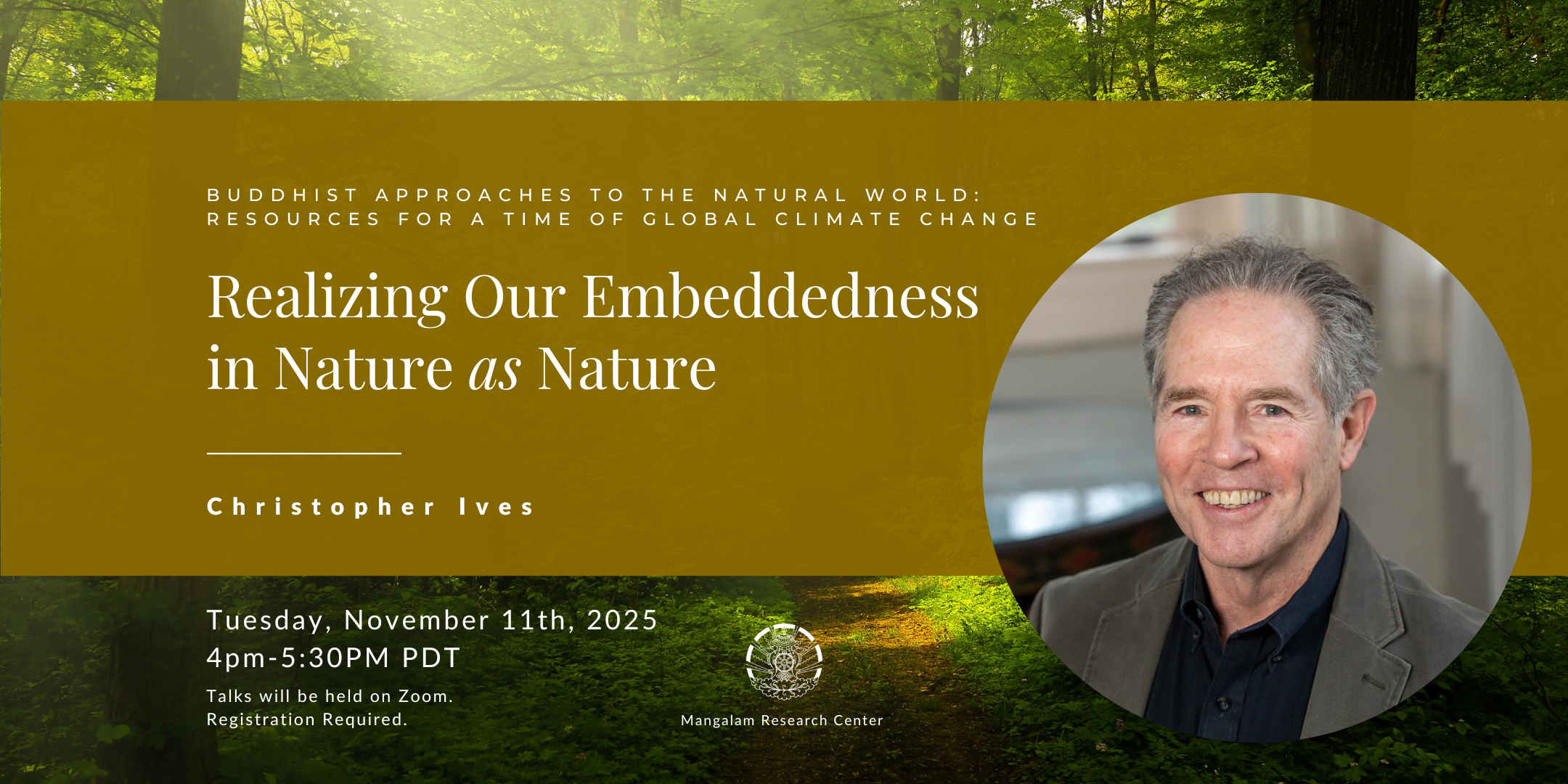Buddhist Approaches to the Natural World: Resources for a Time of Global Climate Change
-
- October 21st, 2025, Karin Meyers, “From Borderline Sentient to Buddhas: The Strange History of Plants in Buddhism.”
-
- November 11 (4-5:30 PT) Christopher Ives, “Realizing Our Embeddedness in Nature as Nature.”
-
- March 3 (4-5:30 pm PT), Janet Gyatso, “The Animal Speaks: Buddhist Resources for a Posthuman Ethics”
- April 14 (4-5:30 pm PT), William Edelglass, TBA.
- March 3 (4-5:30 pm PT), Janet Gyatso, “The Animal Speaks: Buddhist Resources for a Posthuman Ethics”
Past Event
Realizing Our Embeddedness in Nature as Nature.

Christopher Ives
Nov 11, 2025 (4-5:30 PT)
This talk—and conversation—will consider Buddhist resources for overcoming the felt sense of separation from “nature” as something “out there” while at the same time highlighting certain limitations of traditional Buddhist approaches to nature. In particular, such doctrines as conditioned arising, non-dual modes of experience, and the sentience of other-than-human animals constitute rich resources for constructing a Buddhist environmental ethic, but they have ecological limitations, several of which can be addressed through engagement with Gary Snyder’s notion of reinhabitation and David Abram’s writings on the intelligence and expressiveness of animals.
Christopher Ives is Professor Emeritus of Religious Studies at Stonehill College. In his scholarship he focuses on ethics in Zen Buddhism, and currently he is working on Buddhist approaches to nature and environmental issues.
His publications include Zen Ecology: Green and Engaged Living in Response to the Climate Crisis (2025); Imperial-Way Zen: Ichikawa Hakugen’s Critique and Lingering Questions for Buddhist Ethics (2009); Zen Awakening and Society (1992); a translation of philosopher Nishida Kitarō’s An Inquiry into the Good (co-translated with Abe Masao, 1990); and a translation of Hisamatsu Shin’ichi’s Critical Sermons of the Zen Tradition (co-translated with Tokiwa Gishin, 2002). He has also published numerous book chapters and articles in the Journal of Buddhist Ethics, the Japanese Journal of Religious Studies, the Eastern Buddhist, and elsewhere. He is on the editorial board of the Journal of Buddhist Ethics and the Advisory Group of the Forum on Religion and Ecology.
Originally from Litchfield, Connecticut, he received his B.A. in Psychology from Williams College and his Ph.D. in Philosophy of Religion from Claremont Graduate School. He currently resides with his wife Mishy in Watertown, Massachusetts, and relishes getting out onto the trail and out into the surf.
Past Event
From Borderline Sentient to Buddhas: The Strange History of Plants in Buddhism.

Karin Meyers
Tuesday, October 21st, 2025
This talk examines evolving Buddhist views on plants across Asia, from an early Indian ambivalence regarding their status as sentient beings worthy of moral consideration to Mahāyana denials of their sentience, and Chinese debates over whether or not plants, though insentient, nevertheless have “Buddha Nature.” She will put these Buddhist perspectives into conversation with contemporary scientific research, noting striking parallels between ancient Buddhist and contemporary debates about plant intelligence, and how new understandings of plant learning and sociability are contributing to contemporary Eco-Buddhist thinking and practice.
Karin Meyers (University of Chicago PhD, 2010) is a Senior Professorial Lecturer in philosophy American University in DC. She previously taught and directed the the Masters Program in Buddhist Studies at Rangjung Yeshe Institute’s Centre for Buddhist Studies in Nepal, and served as Academic Director of Mangalam Research Center in Berkeley, CA, where she co-directed the 2022 NEH Summer Institute, The Imagination and Imaginal Worlds in the Mirror of Buddhism. Her scholarly publications include articles on intention, free will, and contemplative practice in Buddhism, and as well as on method in comparative philosophy. She is currently editing a volume of essays on Buddhism and the Imagination. Karin has practiced meditation in Theravada, Tibetan, and Zen Buddhist traditions. She is a certified qi gong instructor and recently took precepts in the Zen Peacemaker Order (White Plum Asanga) with the ordination name Koshin (“heart-led”).
